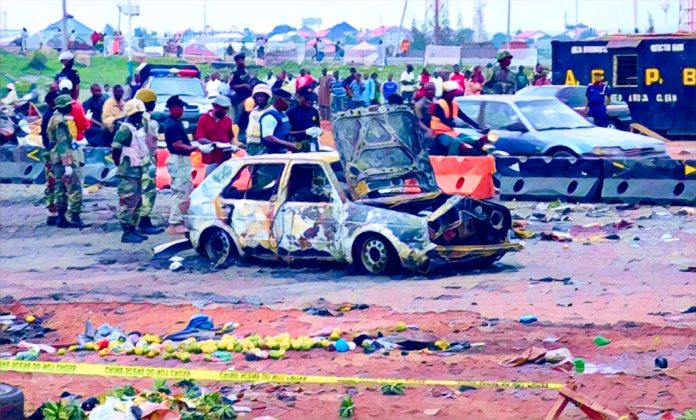Key points
-
Nyanya bombing victims await justice after 11 years.
-
Over 90 adjournments have stalled the terrorism trial.
-
Families say delayed justice deepens their pain and frustration.
Eleven years after the devastating Nyanya twin bombings that killed more than 75 people and injured hundreds in Abuja, victims and their families are still waiting for justice.
The April 14, 2014, attacks targeted a crowded bus station in Nyanya, a suburb of the Nigerian capital.
The twin explosions, later linked to Boko Haram, shocked the nation and drew international condemnation.
While several suspects were arrested and arraigned the same year, the terrorism trial has dragged on for over a decade without resolution.
Delayed terrorism trial raises concerns about justice system
Court records show the Nyanya bombing case has suffered more than 90 adjournments since it began in 2014.
The repeated delays stem from prosecutorial lapses, frequent changes of judges, and poor trial management.
Legal experts say the situation undermines Nigeria’s capacity to handle terrorism cases. Criminal law expert Yemisi Lawal described the delay as both “tragic and avoidable.”
“It is unacceptable that a case involving mass murder is still dragging after 11 years,” she said.
“The delays come from poor preparation by prosecutors, routine adjournments, and judges being reassigned mid-trial.”
Another lawyer, Favour Okonkwo, echoed those concerns. She said endless adjournments, absent witnesses, and judicial transfers had turned the trial into a cycle of frustration.
“If we can have special anti-corruption courts, then we should also create special terrorism courts with fixed judges and strict timelines,” she said.
The Administration of Criminal Justice Act (ACJA), enacted in 2015, was designed to limit adjournments and speed up trials.
Yet many lawyers argue that the law has not been fully enforced. According to them, underfunded prosecution teams, lack of training, and poor logistics for witnesses remain key challenges.
Victims’ families voice frustration over stalled justice
For victims’ relatives, the slow pace of the trial has prolonged their pain. Stella Ibegbunam, who lost her sister in the bombing, said every adjournment reopens old wounds.
“Each time I hear the case has been adjourned again, it reopens the wound. We want justice not in heaven, but here on earth,” she said.
Some suspects have also grown frustrated by the drawn-out process. One defendant, accused of being the mastermind, complained that the case had been adjourned 97 times.
He appealed to the court to dismiss the charges for lack of diligent prosecution. Another suspect even said he was willing to plead guilty just to end his years of detention.
The alleged mastermind, repatriated from Sudan in 2014, faces a seven-count charge that includes conspiracy, belonging to Boko Haram, supporting the group financially, and conducting surveillance for possible attacks.
Prosecutors accuse him of giving money to widows of Boko Haram members and withholding information that could have prevented the Nyanya bombing.
Calls for reform in Nigeria’s criminal justice system
Legal experts and rights advocates argue that terrorism cases should be treated as national security priorities.
They say the government must invest in forensic tools, witness protection, digital case management systems, and well-trained prosecutors.
Kosun Bako, a security analyst, said underfunded prosecution teams cannot effectively prove complex terrorism cases.
“They lack forensic support, reliable logistics, and witness protection mechanisms. Without these tools, it is very difficult to secure convictions,” he said.
The Federal Government has promised reforms, including the creation of National Minimum Standards to improve the implementation of the ACJA across all states.
Attorney General of the Federation Lateef Fagbemi announced in 2024 that the standards would ensure uniformity and efficiency in criminal trials.
Despite these plans, challenges remain. Many victims’ families believe government action has been too slow.
They say justice delayed is justice denied and warn that the failure to conclude terrorism cases weakens public trust in Nigeria’s justice system.
As the trial drags on into its twelfth year, the Nyanya bombing case stands as a painful reminder of how systemic delays leave both victims and suspects trapped in legal uncertainty.



